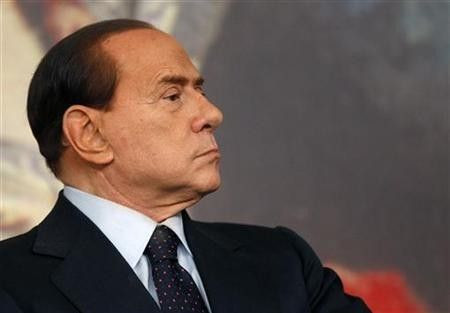Berlusconi vows to stay on, not worried by scandal

A defiant Silvio Berlusconi vowed on Wednesday to see out his term as Italian Prime Minister until 2013, saying he was unworried by an order to stand trial for abuse of power and paying for sex with an underage girl.
For love of country I won't talk about it. Suffice it to say that I am not worried in the least, Berlusconi said in his first public comment since a judge ordered him to stand trial in April over the so-called Ruby affair.
Berlusconi said he expected to broaden his parliamentary majority soon and confidently dismissed talk of an early election in the wake of the scandal. The centre-right coalition was as cohesive as ever and would see out its term until scheduled elections in 2013, he told a news conference.
However, Italy's leading commentators said that ultimately Berlusconi could not stem the tide heading towards early elections. Objectively speaking, Berlusconi is worn down and gasping for breath, wrote Massimo Franco, a political commentator for the Corriere della Sera newspaper.
Berlusconi's lieutenants have blasted the trial order as what they call another calculated move by leftist magistrates to destroy his political career.
But commentators say the momentum against him seems to be building up. The trial date was set two days after hundreds of thousands of people demonstrated throughout the country demanding his immediate resignation.
PLAYING DEFENCE
Berlusconi is now in a defensive position and (the court order) breathes electoral hope into an opposition that smells a precious opportunity to beat him, Franco said.
Another commentator, Stefano Folli of the economic daily Il Sole 24 Ore, said: It's obvious that the legislature is over and parliament is heading towards a paralysis.
The timing of any early elections depends how long Berlusconi's increasingly fragile coalition can stick together.
The sex scandal has riveted Italy and, commentators say, caused untold damage to the country's image abroad. Much will depend on the position of the Northern League, Berlusconi's main coalition partner, and its mercurial leader Umberto Bossi.
Berlusconi, who held talks with coalition leaders on Tuesday night after the indictment was announced, told the news conference that Bossi assured him the League will stand by him.
But commentators say Bossi is merely biding his time until federalist reforms are in place to placate his northern constituents and will then pull the plug on the coalition, as he did in 1994 when he provoked the collapse of Berlusconi's first government.
Berlusconi's legal problems have complicated a political situation already tangled by a split in the People of Freedom coalition last year, which left him barely clinging to power.
The government survived a no-confidence motion in parliament in December by a small margin. Since then, Berlusconi has gradually built up support by winning over deputies from smaller centrist parties and splinter formations.
Italian media have been dominated for weeks by the alleged prostitution affair, which turns on the case of a teenaged Moroccan nightclub dancer named Karima el Mahroug, whose stage name Ruby has become a household term in Italy.
Prosecutors say they have ample evidence that Berlusconi paid el Mahroug for sex when she was under 18 -- an offence in Italy -- and also telephoned a police station to pressure officers to release her after she was held on theft allegations.
She denies having sex with Berlusconi but admits receiving at least 7,000 euros (5,900 pounds) after attending a party at the premier's luxurious private residence at Arcore near Milan.
Berlusconi has denied doing anything illegal in the case and says he has been targeted by politically-motivated judges backed by the left who are determined to bring him down.
He says he has never paid for sex and says that when he telephoned the Milan police station it was because he believed el Mahroug to be the granddaughter of then Egyptian President Hosni Mubarak and he wanted to avoid a diplomatic incident.
© Copyright Thomson Reuters 2024. All rights reserved.





















